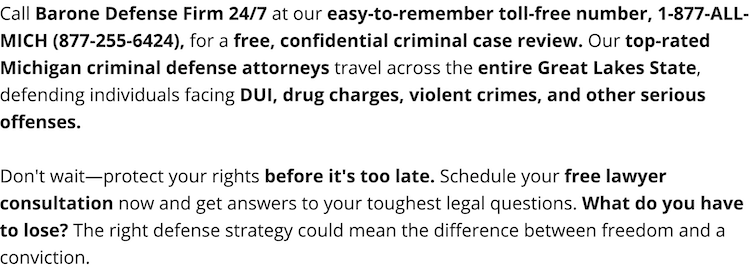Grand Rapids Anti-Kickback Statute Violations Lawyer
The federal Anti-Kickback Statute prohibits individuals and businesses from entering into arrangements to provide kickbacks, bribes, or rebates in exchange for referrals covered by Medicaid, Medicare, Tricare, and other federal health care programs. Allegations of Anti-Kickback Statute violations can result in harsh consequences for the parties involved, as they also may constitute violations of the False Claims Act.
You may wish to get help from a Grand Rapids Anti-Kickback Statute violations lawyer when facing such accusations.
Even innocent or unintended violations of the federal Anti-Kickback statute might result in severe repercussions, and a dedicated health care fraud attorney can evaluate your situation and advise you on the best defense strategy available for your case.
Explaining the Federal Anti-Kickback Statute
42 U.S.C. § 1320a-7b, commonly known as the federal Anti-Kickback Statute, makes it a felony offense to intentionally offer, pay, solicit, or receive compensation—whether directly or indirectly—to obtain referrals or business for services reimbursable under any federal health care programs. To prove a violation of the Anti-Kickback Statute, the federal government must show that some form of remuneration passed between the parties and that this transaction occurred as a result of illegal intent.
Remuneration in this context can essentially include anything of value, including money, gifts, rebates, or other valuable items used for kickbacks, bribes, or rebates. Other examples of compensation could be the payment of contractual obligations, travel and entertainment expenses, and purchases of new equipment. Even if the benefit had more than one purpose, it may violate the Anti-Kickback Statute if it is related to business referrals that would qualify for federal reimbursement.
Courts also have construed unlawful intent in Anti-Kickback Statute cases very broadly. There is no need for prosecutors to prove that health care providers had specific intent to violate the statute or even had actual knowledge of the statute—it is considered sufficient that their purpose was to cause or reward referrals. Consequently, retaining the services of an accomplished attorney in Grand Rapids can be critical to building a strong defense to allegations of Anti-Kickback Statute violations.
Criminal and Civil Penalties and the Anti-Kickback Statute
Violations of the Anti-Kickback Statute by individuals or companies that provide health care services may result in either civil or criminal investigations. In a civil investigation, which could involve a lack of intent to commit a crime or a lack of knowledge that actions were illegal, the federal government would seek purely monetary remedies, such as reimbursement of fraudulently-obtained funds and civil fines.
Alternatively, a criminal investigation can lead to criminal felony charges being filed against an individual or organization. In this case, the federal government may seek both monetary penalties and criminal penalties, which may include federal prison sentences.
Safe Harbor Provisions
The U.S. Department of Health and Human Services (HHS) has established various “safe harbor” provisions that allow for legal business arrangements between physicians and non-physician health services providers. If physicians and health services businesses enter into these types of agreements, they would not violate the federal Anti-Kickback Statute.
Some of the available safe harbor arrangements include:
- Space and equipment rental contracts
- Price reductions offered to health plans
- Compensation to legitimate employees
- Investments by physicians in medical facilities in which they refer their payments, so long as they meet specific requirements
Entering into any safe harbor arrangement should assure physicians and other medical services provider alike that they are not violating the law. An Anti-Kickback Statute violations lawyer in Grand Rapids could assess proposed agreements and ensure that they are legally sound.
Call a Grand Rapids Anti-Kickback Statute Violations Attorney for Help
Offering, paying, or receiving kickbacks, bribes, rebates, and other forms of compensation in exchange for referrals that are reimbursable under a federal health benefits program can violate federal law. Claims made as a result of illegal referrals also constitute false and fraudulent claims according to the False Claims Act, which carries the potential for additional penalties.
Violations of these federal laws can result in both civil and criminal penalties. They also may result in other consequences, which includes the inability to participate in or receive reimbursement for claims filed with federal benefits programs in the future.
If the federal government has accused you of committing health care fraud in this manner, you should consider looking to a Grand Rapids Anti-Kickback Statute violations lawyer for counsel. Seeking legal representation as early as possible in any health care fraud investigation may have a significant impact on the ultimate outcome of your case, so call today to get started working on yours.
 Barone Defense Firm Home
Barone Defense Firm Home
















